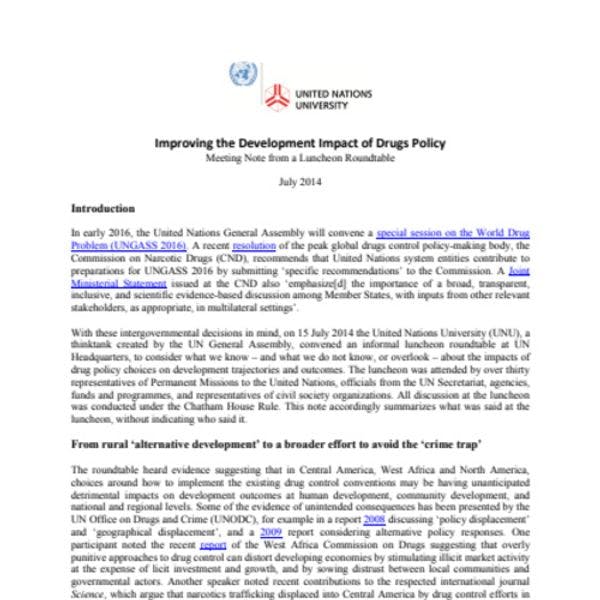Improving the development impact of drugs policy - Meeting note from a luncheon roundtable
In early 2016, the United Nations General Assembly will convene a special session on the World Drug Problem (UNGASS 2016). A recent resolution of the peak global drugs control policy-making body, the Commission on Narcotic Drugs (CND), recommends that United Nations system entities contribute to preparations for UNGASS 2016 by submitting ‘specific recommendations’ to the Commission. A Joint Ministerial Statement issued at the CND also ‘emphasize[d] the importance of a broad, transparent, inclusive, and scientific evidence-based discussion among Member States, with inputs from other relevant stakeholders, as appropriate, in multilateral settings’.
With these intergovernmental decisions in mind, on 15 July 2014 the United Nations University (UNU), a thinktank created by the UN General Assembly, convened an informal luncheon roundtable at UN Headquarters, to consider what we know – and what we do not know, or overlook – about the impacts of drug policy choices on development trajectories and outcomes. The luncheon was attended by over thirty representatives of Permanent Missions to the United Nations, officials from the UN Secretariat, agencies, funds and programmes, and representatives of civil society organizations. All discussion at the luncheon was conducted under the Chatham House Rule. This note accordingly summarizes what was said at the luncheon, without indicating who said it.
The key themes were the following ones:
- From rural ‘alternative development’ to a broader effort to avoid the ‘crime trap’
- The links between drugs, drug control policies and development trajectories
- Global drugs policy and ‘sustainable development
- Preparing for UNGASS 2016
Keep up-to-date with drug policy developments by subscribing to the IDPC Monthly Alert.
Downloads
Topics
- Drug dependence treatment
- Development (SDGs +)
- Cultivation of crops deemed illicit
- Criminal justice
- Civil society engagement
- Alternative livelihoods
- 2016 UNGASS
- Harm reduction
- Human rights
- Prisons & incarceration
- UN drug conventions
- Health & harm reduction
- Development & environment
- Violence, policing & punishment
- Human rights and social justice
Regions
Related Profiles
- United Nations
